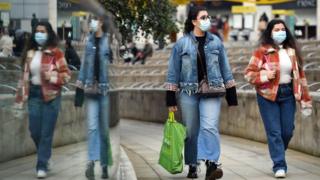Covid: New restrictions system 'fundamentally flawed' says Burnham
 Image copyright
Getty Images
Image copyright
Getty Images
The new system of local coronavirus measures is "fundamentally flawed", the mayor of Greater Manchester has said.
A three-tier system for England was announced on Monday, with the Liverpool region being placed in the highest level, with far stricter restrictions.
Andy Burnham told the BBC he "resisted" the city being placed in the same category because it would cause "certain harm" to the economy.
Each level of restrictions is imposed after talks with local leaders.
Every area in England is categorised as on medium, high or very high alert under the system.
- How will the three-tier lockdown system work?
- The county pleading for tighter Covid restrictions
- Science advisers urged short lockdown weeks ago
Mr Burnham, Mayor of Greater Manchester, told BBC Radio 5 Live's Emma Barnett Show: "They've created tier three without a proper economic support package and they're trying to pressurise people into tier three, even though it will do certain harm to those economies, often quite fragile economies in the north.
"That is why tier three as currently constructed is fundamentally flawed and why we have resisted being pushed into it."
Manchester does not have Covid hotspots to the same degree as Liverpool, which is the only area to be placed in the highest tier, and the number of people admitted to hospital is lower, Mr Burnham said.
And he said England's chief medical officer, Prof Chris Whitty, had acknowledged he was not confident the base tier three measures "would be enough".
Mr Burnham said that he would prefer a short "circuit-break" national lockdown to "reset things", including putting the Test and Trace system under local control. It was revealed on Monday that the government's scientific advisers had called for a short lockdown of this kind last month.
Recommendations over which areas are placed in particular Covid alert levels are made at a series of daily and weekly meetings involving NHS Test and Trace, Public Health England, the chief medical officer, the Department for Health and Social Care and ministers, along with the Joint Biosecurity Centre.
A final decision is only made after consultation with local authorities and local leaders.
Under tier three, or the very high alert level, these talks also decide any additional measures that are deemed necessary to bring the infection rate under control.
But Liverpool mayor Steve Rotherham said it was "totally false" that the new measures had been agreed to locally and that they had been "dictated to us by the government".
Meanwhile, Essex has become the first place to call for extra restrictions.
The county said it should be moved to high alert to prevent "further escalation" into the highest tier later, leading to damage to the economy.
What are the restrictions?
Most places are under the lowest tier, the medium alert level, with current restrictions continuing, including the 10pm hospitality curfew and the rule of six.
Areas already under additional local restrictions are automatically in the high alert level, which means bans on household mixing indoors are extended to include hospitality venues.
The very high alert level - at a minimum - sees pubs and bars close if they do not serve "substantial meals", almost all household contacts banned and advice against travel. The rule of six will continue to apply in outdoor public spaces such as parks.
In Liverpool City Region, betting shops, gyms, leisure centres and casinos are also being closed as part of additional measures.
Essex is calling for its 1.4 million residents to be placed on the high alert level after its director of public health warned the increase in cases would continue to accelerate without urgent action.
Council leader David Finch said they wanted "above all" to avoid the economic damage of being placed in the highest tier of restrictions at a later stage.
"Making these painful decisions now will, we hope, bring dividends later," he said.